Oct. 14, 2021
As Victoria Smalls's car raced across the bridge connecting Hilton Head Island, South Carolina, to the rest of the world, apprehension filled her mind. She was on her way to a public meeting — the first in a nascent planning process close to her heart. Despite waking that morning with a great sense of purpose and pride to be assisting in the process of listening and learning from the island's native Gullah Geechee residents, she was also anxious.
Born just to the north on St. Helena Island in a close-knit Gullah Geechee community, Smalls spent her teen years living on Hilton Head Island but moved away for college. Would the native islanders remember her and embrace her as a community member? Or would they view her with suspicion because of her role on a planning team hired by the town?
Smalls, a specialist in Gullah history and culture who, at the time, worked as program manager for the International African American Museum, has since been hired as the executive director of the national Gullah Geechee Cultural Heritage Corridor. She was the consultant team's point person for cultural preservation.
Her wariness was understandable. While multiple plans for Hilton Head had been prepared over the years, this would be the first focused specifically on the Gullah community since the town incorporated in 1983. Distrust of development had been building since the 1950s, when the first bridge to mainland South Carolina was constructed. Prior to that, the Gullah — whose ancestors were brought to the region as enslaved people from Africa's West Coast in the 1700s — made up 100 percent of the island's population. The Gullah had owned and farmed the land there since just after the Civil War.
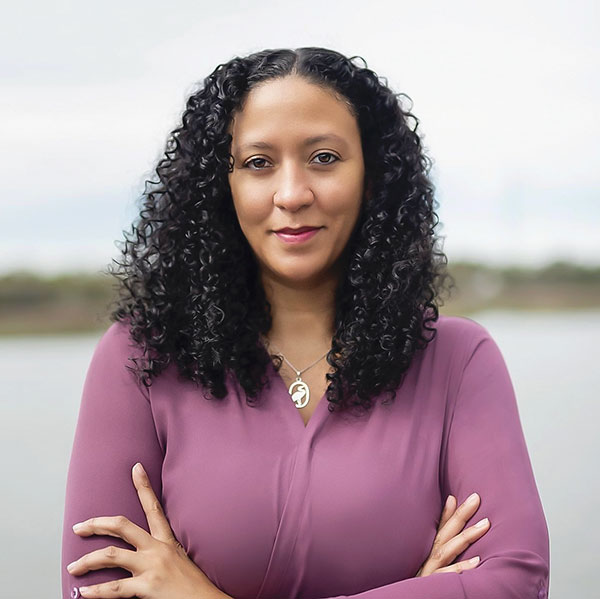
Victoria Smalls, who is Gullah and the planning team's cultural liaison to the community. Photo courtesy of Victoria Smalls.

A scene from Skull Creek, near the Karl Bowers Bridge, which connects Hilton Head Island to the mainland. Photograph by Bailey Davidson.
Today, that community accounts for just six percent of Hilton Head Island's 40,000 residents. And because of continued development, various public policies, difficulty establishing land ownership, and economic limitations, Gullah history, language, and culture are at risk of disappearing.
"We're frustrated, and it's been going on for 50 or 60 years. The growth has overwhelmed us," says David White, a local Gullah resident.
In response, the town established the Gullah-Geechee Land & Cultural Preservation Task Force in 2017 as an ad hoc committee to the planning commission. As then-Mayor David Bennett stated, "We need to figure out how to help the Gullah people be economically sustainable."
The task force identified three major focus areas for the project that, if addressed, could help resolve the challenges faced by the local Gullah community: cultural preservation, public policy surrounding land development and ownership, and the deep history of properties passed on through generations without clear title. The town hired a three-person consultant team — of which Smalls and the author of this article were members — to carry out the ambitious planning process, which included extensive public engagement with Gullah residents, coordinated by Jayme Lopko, AICP, Hilton Head's senior planner.
The resulting plan, approved in September 2017 and currently being implemented, underscores a broad range of planning work — from cultural preservation to revisioning a complex zoning ordinance — that offers planners an equally wide breadth of lessons and insights.
Balancing act
Hilton Head Island is most known for its thriving tourism, beach resorts, golf courses, and gated communities. However, as Gullah resident David White said at one of the numerous public engagement activities, "The history of Hilton Head did not start with a nine-hole golf course."
West Africans were brought there because of their knowledge of rice cultivation and general ability to cope with heat, humidity, and tropical diseases. They lived there in relative isolation; even the plantation owners' overseers, referred to as "rice drivers," were Gullah. Aside from Union soldiers stationed there during the Civil War (which prompted the white plantation owners to abandon their lands), the Gullah dominated the island's social fabric for centuries.
Historically, the Gullah people occupied the coastal lands and barrier islands along the southeastern coast of the U.S. Today, most reside in an area that extends roughly from Wilmington, North Carolina, to St. Augustine, Florida, and are concentrated in Georgia and South Carolina.
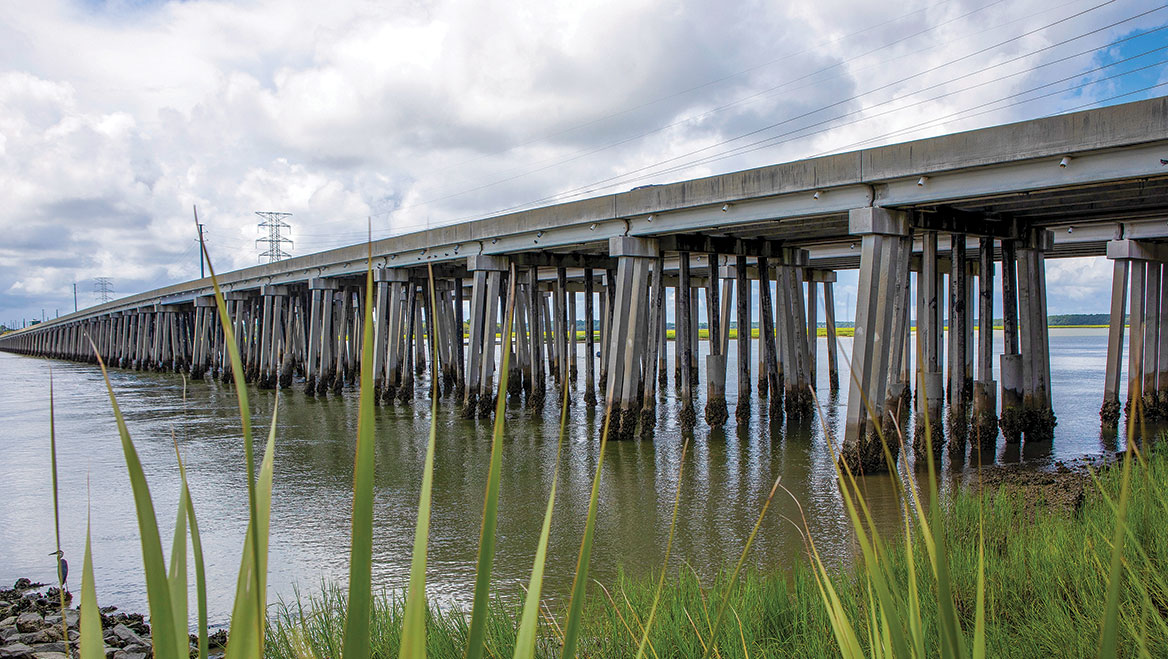
The Karl Bowers Bridge onto Hilton Head Island. Photograph by Bailey Davidson.
A turning point for the Gullah of Hilton Head occurred when investors purchased 20,000 acres of land for a logging operation, followed by construction of the first bridge to the island from Bluffton, South Carolina. Not long after, came developers, who kicked off a trend that slowly transformed it from a natural setting occupied by generations of Gullah to a hot spot for affluent white people and their resorts, golf courses, and gated communities. Gullah traditions faded into the background — but weren't totally erased.
"We have history here, but we have camouflaged it," says Emory Campbell, who manages Gullah Heritage Trail Tours and was born and raised on the island.
While the remaining Gullah residents collectively own more than 1,000 acres of land, much of it is environmentally or economically constrained, making their traditional farming and fishing livelihoods and cultural activities untenable. Ownership is also clouded by property title issues, which limit their ability to sell or develop their land. Complicating matters, most Gullah residents work in low-paying jobs. Many reside in trailers served by septic systems; sewer hookup fees are often cost-prohibitive, although the town is working to reverse that. With limited economic opportunities, they often struggle to pay property taxes, which puts them at risk of losing their land altogether. There is also the negative impact of non-Gullah development — like gated communities — that hampers access to historic cemeteries.
The combination of these circumstances made the project extremely complex. "The community [was] seeking to achieve a balancing act," says Craig Richardson, director of the North Carolina office of Clarion Associates and the consultant team's third member. Richardson was the original author of Hilton Head's Land Management Ordinance (LMO), which was adopted in 2014.
The resulting plan had to juggle multiple and equally important objectives: protecting the natural environment, protecting the desired character of the Hilton Head community, respecting Gullah history and traditions, and providing economic opportunities to Gullah landowners by providing more development flexibility and potential.
Cultural preservation
Because of the island's isolation from the mainland prior to the mid-20th century, the Gullah's West African culture remained intact. Sweetgrass basket weaving, quilting, and knitting fishing nets are a few of the cultural crafts passed down generationally, along with folklore, stories, and songs. Crabbing is another cultural activity, as is cooking traditional, Low Country recipes like Hoppin' John, sweet potato pie, and benne wafers.
Their communities are often referred to as "Geechee," which Smalls says was a derogatory term when she was growing up, used to belittle African American people who spoke differently — in this case, an English-based creole language, also called Gullah. Smalls recalls first noticing around age nine how people would laugh at how she spoke. Feeling ashamed, she worked hard to change her speech. By the time she left for college, her Gullah accent was gone. Her story isn't unique within the Gullah community.
"Our language is almost lost, and when people who know it are gone, the language will be gone," says Louise Cohen, a native Gullah islander. Through education and cultural events like the annual Gullah Celebration, they hope to turn that around. "[Involvement in the] Gullah Celebration is what got me over the shame of speaking the Gullah language," she adds. The event inspired her to step out of her "shell of shame" and become a Gullah storyteller. She founded the Gullah Museum of Hilton Head Island in 2003.
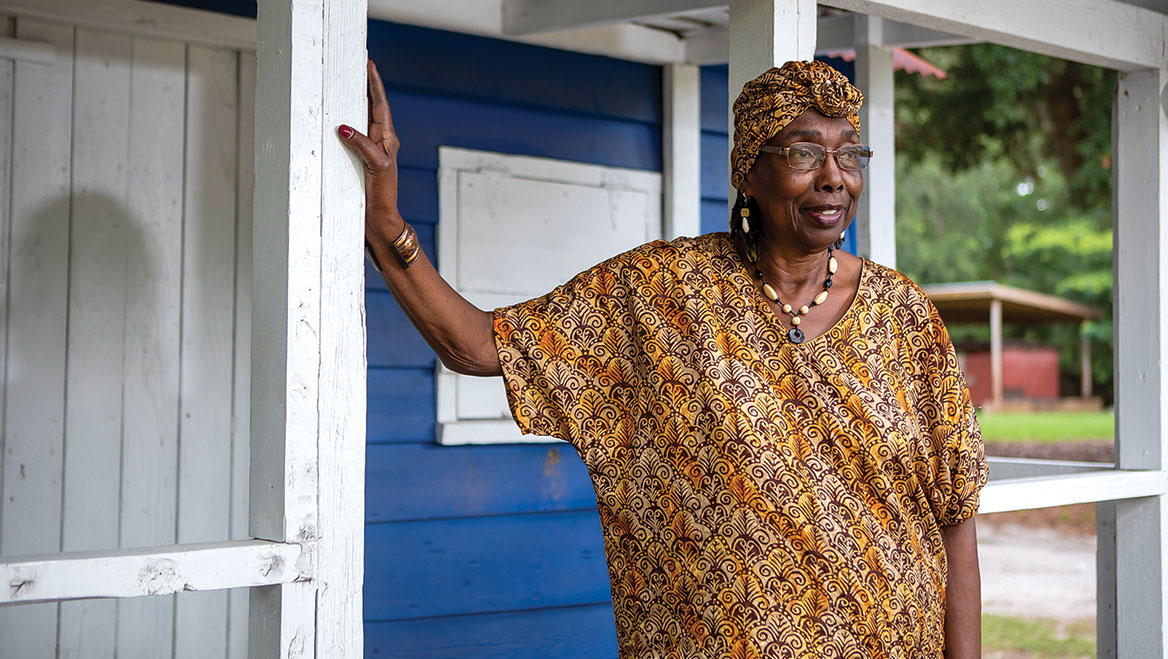
Louise Cohen, director of the Gullah Museum of Hilton Head Island, on the porch of the William Simmons house, a typical Gullah farm community home built in 1930. The house became the museum in 2011. Photo by Bailey Davidson.
Based on Cohen's and other community members' input, the project consultant team proposed more than a dozen cultural preservation strategies, including education on traditional Gullah ways, preserving and exhibiting Gullah sites, tourism and marketing around Gullah culture, and ensuring the space and support to sell and display Gullah arts and crafts.
Public policy
Because the Gullah culture is based in part on agriculture, land is crucial to their identity. "Land is a sacred matter to many Gullah people because the land has been passed down generationally as ancestral land and represents freedom, self-sufficiency, and self-determination," says Smalls.
After slavery ended, the Gullah on Hilton Head were given an opportunity to purchase land, but over time, development pressures and prohibitive policies resulted in substantial restrictions on land uses and loss of Gullah land altogether. For example, a ban on firing guns within town limits prevents hunting, while licensing requirements preclude roadside vegetable stands.
"A lot of us lose land because we can't afford to pay the taxes," says White. Adjusting land-use policies could help, many say. "Buffers and setbacks must be eased. They eat up all the property on small lots," another Gullah resident, Curtis Barnwell, stated in a focus group meeting.
"Our community is different and doesn't fit into the same box as the rest of the island," says Alex Brown, the only Gullah person on the town council. He's concerned that too much information is required for development applications, often requiring the hiring of an attorney, which many cannot afford.
With that in mind, most of the plan's public policy strategies are tied to land development, with the intent to give Gullah property owners more options for their land — whether they want to preserve it, develop it, or sell it.
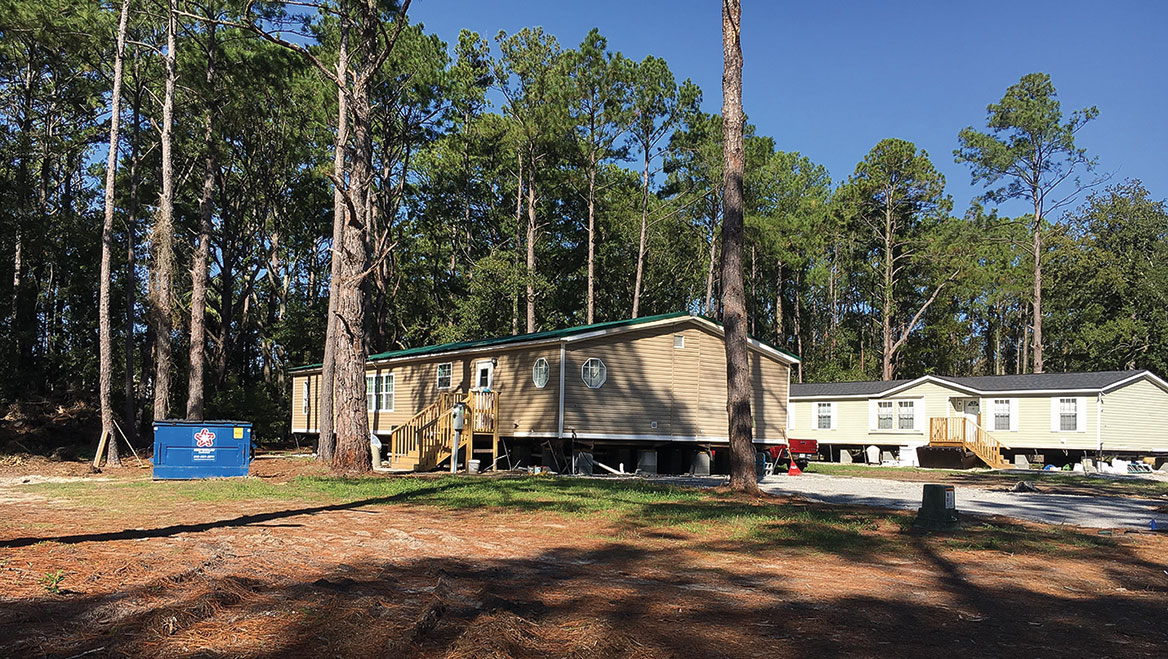
Many of the Gullah community live in trailer homes on their property as development options for their land is restricted. Photo by Philip Walker.
Because land-use and development policies cannot legally be tied to one's ethnicity and culture, the consultant team proposed an overlay zoning district for historically Gullah neighborhoods. Most of those areas are not very developed and lack cohesive design, so the overlay designation is based on current and historical habitation patterns. The planning commission recently approved the overlay district, and the town council is now studying it for approval, which residents and the consulting team hope will happen soon.
The overlay district will allow higher densities for some of the residential zoning districts, which could increase land value. The council also is poised to adopt the recommended "family compound" provisions, which avoid triggering the full range of subdivision requirements and instead allow multiple housing units on a single parcel. However, because of pushback over the fact that non-Gullah property owners might benefit from the loosened regulations, the town is now exploring ways to limit those benefits to people and their heirs whose ownership dates back to 1956, when the first bridge to the mainland was constructed, or earlier.
To make development and use of smaller properties more viable, the overlay reduces some setback, buffer, and open-space requirements and allows narrower widths, as needed, for required road rights of way and easements. To preserve Gullah property ownership and financial benefits, the overlay also will include transfer of development rights. A program to purchase development rights from willing Gullah property owners is intended to avoid too much development in Gullah neighborhoods and preserve their land ownership while still allowing land owners to benefit financially.
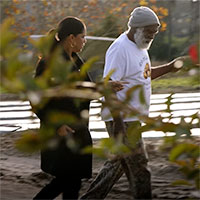
Earlier this year, the BET Network's series hosted by Soledad O'Brien released "Disrupt and Dismantle." Episode 3: "The Battle for Black Land," focused on the Gullah people's struggles on Hilton Head Island and shed light on the planning project.
The designation of the overlay district would also provide a vehicle for the town to amend its existing corridor overlay design guidelines with respect to their treatment within the neighborhoods. Rather than conveying the character of a beach resort community with extensive building setbacks and landscaping — the only current option — development would be more in keeping with the character of historic Gullah neighborhoods, which includes frame dwellings with clapboard siding, front porches, metal roofs, bold paint colors, and no formal landscaping.
In addition to the overlay, the plan recommends establishing a fund to help Gullah property owners avoid losing their land to delinquent tax sales. It also recommends educating Gullah residents on a range of public policy issues that impact their lives, including land use and development, heirs' property, and property taxation.
Heirs' property
As in many African American communities throughout the South, Gullah property is often passed down from generation to generation. As a result, many Gullah people lack a title and, consequently, cannot sell or get a loan to improve it.
There are clearly no easy remedies to this thorny problem. Multiple regional and national organizations focus solely on this topic, including the Charleston-based Center for Heirs' Property Preservation (CHPP). But even when remedies or partial remedies do exist, the process tends to require a great deal of work for property owners.
"It needed to be in there just to remind people of the issue and to figure out how best to tackle it specifically for Hilton Head Island," says Sheryse Grant DuBose, PhD, who is the town's historic neighborhoods preservation administrator in charge of the plan's implementation. With strong planning credentials, Gullah heritage, and island roots, DuBose is well positioned as the liaison between the town and Gullah community, including helping to interpret the many complexities of the Land Management Ordinance.

Sheryse Grant DuBose, a planner and Gullah, at Squire Pope Community Park, where she is working to begin an open-air market for Gullah small entrepreneurs. DuBose was hired as the town's historic neighborhoods preservation administrator, to work with Gullah landowners and implement the plan's recommendations. Photo by Bailey Davidson.
Proposed strategies include: using the Heritage Library Foundation, a nonprofit member library offering services in researching ancestry and documenting the history of Hilton Head Island, to help Gullah families research their family history; leveraging a range of local, state, and national organizations involved with addressing heirs' property issues; and encouraging the CHPP to open a satellite office in Beaufort County, South Carolina, to make its resources more readily available to the island's Gullah community. Since this recommendation, the Foundation opened the Heritage Library Genealogy Clinic at the University of South Carolina Beaufort, which will create genealogies for Gullah families to take to the CHPP or their private attorneys as the first step in tackling heirs' property challenges.
Broader implications
Despite Smalls's initial concerns about how she would be received the morning of that first public meeting, she needn't have worried. Upon entering the public meeting, she was welcomed by some Gullah residents she knew — and many she didn't. "Working on this project filled me with a great deal of pride that I could assist my people with their voices being heard by town officials," says Smalls.
Though the COVID-19 pandemic has slowed plan implementation, DuBose says they're making progress and "have pretty much worked directly off the plan's recommendations, which we've reviewed forward and backwards."
When it comes to lessons learned, the consultant team says this project drove home for them the fact that even the best process can result in an outcome that does not completely satisfy all parties involved.
Even with extensive public engagement and a dedicated task force guiding the effort, not all Gullah residents are fully behind it. Time will tell if this plan will help the community maintain its vanishing culture. But one thing is certain: When it comes to marginalized communities of color, decades of understandable distrust of local government cannot be reversed overnight.




